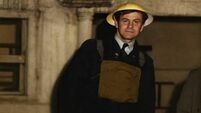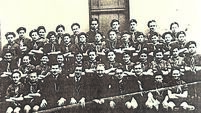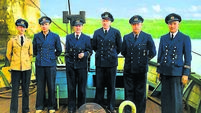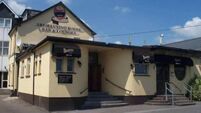Throwback Thursday: Cork memories of when we learned the Irish language
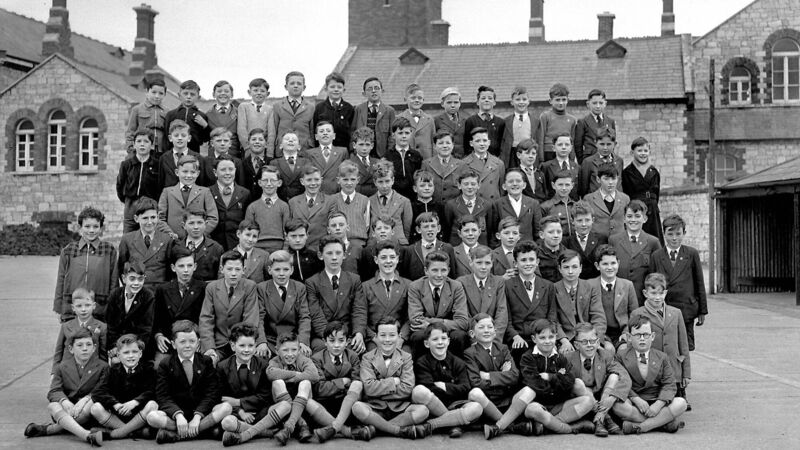
Fáinnes presented to pupils at the Model School, Anglesea Street, Cork, in March, 1956 - this was a pin badge to show fluency in and a willingness to speak Irish.
I CAME across a really good idea the other day, which duly got mentioned in my Theatre Nights column, but certainly deserves highlighting here too, as it taps into an old grievance, all-too-familiar to those of us who were schoolchildren in the 1950s and ’60s.
Comedian Áine Gallagher is touring around the country with a one-woman show called Cup of Focals, which encourages her audiences to laugh, have fun, and in the process lose their hang-ups about speaking our native language.
The idea stemmed from her own personal life journey, which included recurring Leaving Cert nightmares, fears and avoidance of those smug fluent speakers, and the inevitable grammatical slip-ups.
You can catch the Cup of Focals show at Coughlans Bar in Ballintemple on Thursday night next, November 30, but the interest sparked by the whole notion made us wonder what your own experience of being taught the mother tongue might be.
So much depended on factors such as where you grew up, what school you went to, and your parents’ attitude.
If you lived in a Gaeltacht area, you were away with a kick-start, obviously, with strong governmental encouragement and even free university places.
Failing that, if you were at a school where everything was taught ‘through the medium’, then you had to gain some knowledge and fluency, whether you enjoyed it or not.
For the majority of schoolkids, though, it seems to have been disliked (is hated too strong a word?) as much as it was resented. And that unfortunate result all too often continued into adulthood.
Some of you might still feel it even now, although many have softened in later years to realise that it is after all quite something to be able to speak a few words of our native language.
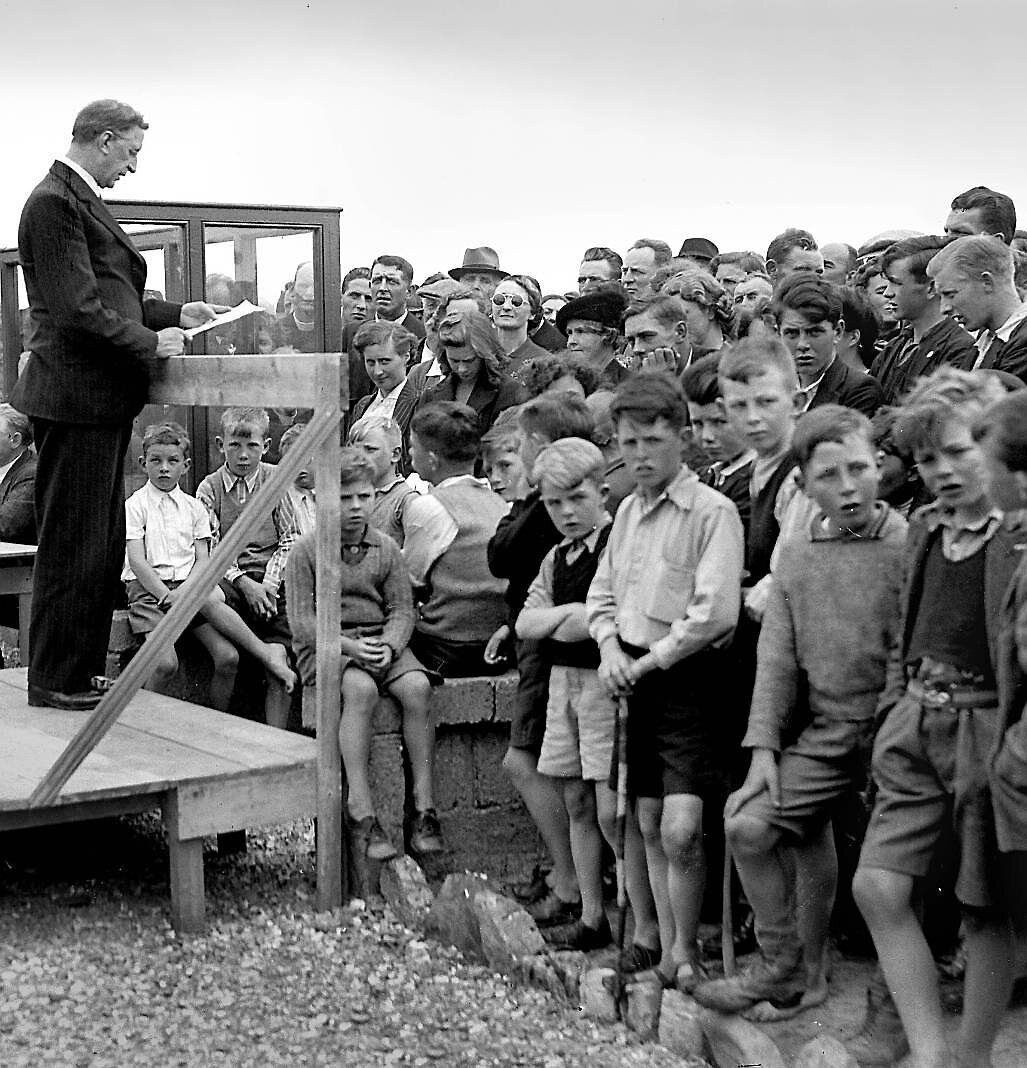
Donal Murray is one such person who has less than fond memories of learning Irish.
“There’s nothing to tell,” said Donal, when urged to explain why he disliked Irish at his junior school.
I just hated it, that’s all there’s to it.
The whole idea of Irish being an “essential subject” for matriculation to the new National University of Ireland began in the early 20th century. It then became a compulsory subject for all national schools in the new Irish Free State in 1922.
At the same time, a good knowledge was compulsory if you wanted to have a hope of entering the Civil Service. By 1928, you couldn’t get the Inter Cert without it, and in 1934, not only compulsory Irish but also an oral Irish exam became mandatory for the Leaving Cert.
You can understand what Éamon deValera and his officials were after, and why. We had been subjected to the most rigorous re-culturing by England’s colonial rule (you have, presumably, heard of the ‘tally sticks’ used in 19th century schools here, whereby pupils received a stroke of the cane for every Irish word they accidentally used), and naturally enough the new Ireland wanted to get its own native culture back. It is very unfortunate, though, that such a laudable aim caused so many to turn away.
Ger Fitzgibbon attended secondary school in Pres in the 1960s. “The whole thing about Irish there was a very mixed message,” he recalled.
“Dan Donovan taught Irish in the upper secondary - he was passionate about it, a fluent speaker, etc, and some of that communicated to some of us. But the prevailing feel of the school was quite anti-Irish and it was definitely uncool to see it as anything but a painful duty (like fish on Friday) rather than a rich inheritance or our birthright.
Ger continued: “This was compounded by a dominant utilitarian approach to education (What use is Irish?) and a kind of snobbery about it. (After all, nobody on the South Mall spoke Irish!)
I’m sure all this sprang from the under-lying drive of the school - to educate the Catholic middle class into positions of social standing. Irish was not seen as the language of that particular future.
“That whole thing came into sharp focus one day when a very intense, committed Irish teacher came into class and asked us if we were going to see Mise Éire. All the schools were going, so naturally we were. We thought he’d be happy that we were all going to see it. He flew into a total melt-down rage, throwing books around and telling us we were spineless hypocrites, only going to see this important Irish film because it gave us a half-day.
“I think he was a genuine idealist and the whole Pres attitude had got to him.”
(Oh Mise Éire! Apart from Corkman Seán Ó Riada’s incredible and unforgettable musical score, it wasn’t exactly a seismic experience for most schoolkids back in the mid 20th century. Urged to write essays about it, explain its wonder, its attraction, students stuck their heels in and refused. At a film club for young viewers, a prize was offered for the best review of the piece. Not one single entry was received.)
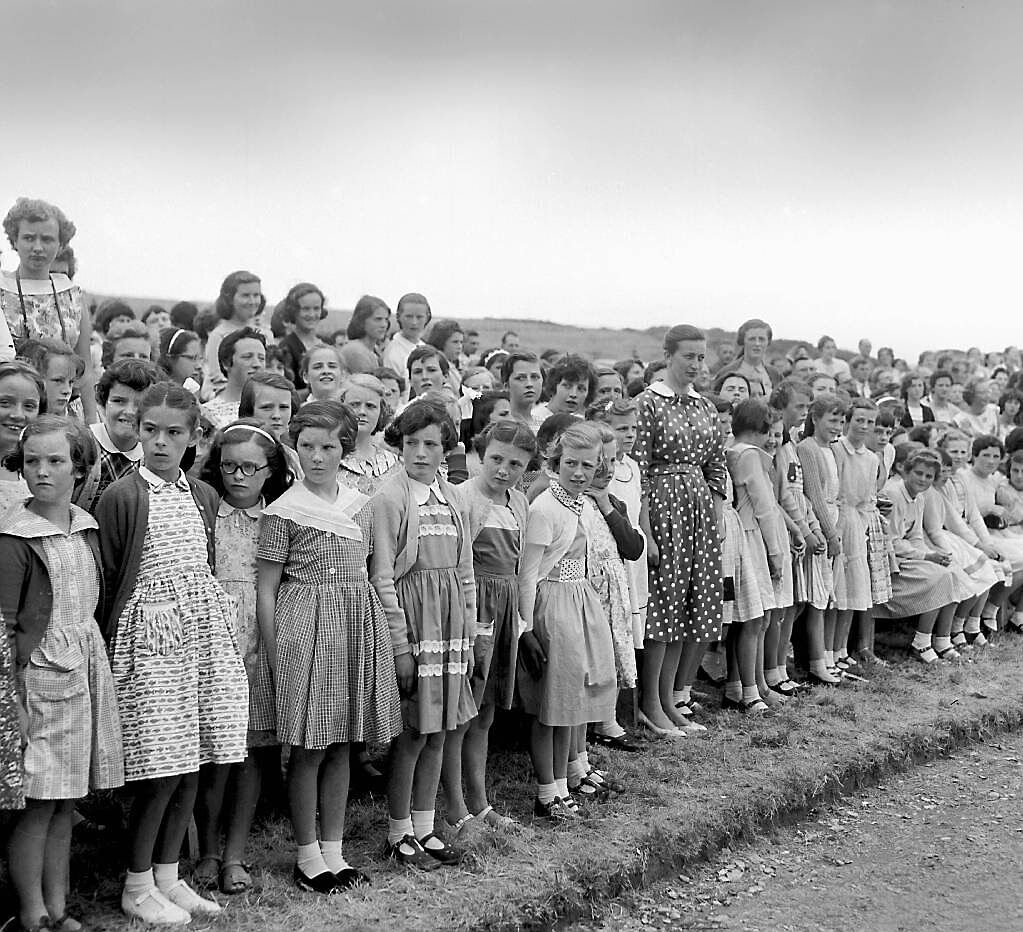
But back to Ger Fitzgibbon’s memories.
“Before Pres, I had a brief spell in Sullivan’s Quay (upper Primary) where I experienced some of the best and the worst teaching I ever encountered and, as much of that was through Irish, had a similarly mixed response.
“It’s fair to say that fear was the main pedagogical methodology in Sully’s Quay. Despite that, there were exceptions. One of the best was a Mr Roycroft, a big, strong chap who cycled to school every day.
“One day he was late, arrived into class, apologised to us for being late (!), then disappeared and re-appeared up three flights of stairs carrying his big, old heavy bike over his shoulder.
He up-ended the bike in front of the class and proceeded to teach us how to fix a puncture through the medium of Irish. I thought it was a genius idea. A few of us had bikes (or had older siblings who had bikes) and others aspired to them.
“Up to that point, we had all been learning a version of Irish devoted to explaining how to foot turf or sell donkeys or cut seed potatoes (I still have bits of that vocab’ rattling around in my brain). Suddenly, here was something - in Irish - that actually connected with our own experience!”
The fear and dislike of Irish, recalls Ger, was not helped by his own home atmosphere which regarded native Irish culture (traditional singing, Irish language on radio, etc) as a kind of embarrassing relative, that couldn’t be totally disowned but was definitely not to be encouraged.
“Although, like a lot of people, I retain a good deal of passive Irish,” adds Ger, “I never developed confidence with it.
“One thing that infuriates me retrospectively was the ideological nonsense that came with it at school - that the Irish language (like the Irish race) was a pure, unsullied thing, unchanged and unchanging, uncontaminated by international history, invasion, commerce or cultural influence.
“The myth of language purity, like the myth of racial purity, was a stultifying and pernicious nonsense that was inflicted on us.
It was years before I began to connect Irish with its European cousins, to see the Irish ‘seomra’ as a phonetic rendering of French ‘chambre’ or ‘garsún’ as a version of ‘garçon’.
Did Ger remember, we asked, the leading position that Coláiste Chríost Rí (CCR) held in the Irish stakes back in those days? How, in the frightening Irish debates that were regularly inflicted on the city’s schools, the Chríost Rí lads would easily win every single time, not only making their arguments in richly fluent colloquial language, but also thumping the podium and shaking their fists in an enviable confidence, reminiscent of politicians, to which the rest of us, shakingly trying to compose sentences without too many glaring errors, could never hope to aspire. (Well, Micheál Martin learned his skills there, didn’t he?)
“Re CCR, as far as I know,” commented Mr Fitzgibbon, “most subjects were taught through Irish there and the school ethos was definitely nationalist and pro-Irish. That, combined (I suspect) with a good deal of physical reinforcement, may have had the desired effect.
Why not get the inside information from one of those who actually attended CCR? You will remember Tony Finn. Now living in the UK, whence he emigrated with his family at the age of 16. He is still determined to come back to that same Coláiste one of these days to collect his Inter Cert! They are still holding it safely for you, Tony!
He was quick to reply: “I don’t think that Chríost Rí had a magic formula, but many factors contributed to the students’ ability to speak Irish well and perhaps the foundations were laid at home and during primary school years.
“In my own case, I went to Scoil Barra (the Model School) primary where every subject was done through the medium of Irish and all conversations between pupil and teacher were in Irish, inside and outside of the classroom to help us develop our use of spoken Irish.
Of course, we had the additional incentive that if we did our Primary Cert though the medium of Irish, we got an extra 10% added to our marks!
“ I also recall that some of my fellow-pupils at the Model spoke Irish at home, so to them Irish was their first language.
“By the time I went to Chríost Rí , Irish came naturally to me and I could speak it fluently, and I’m sure I was not alone in that.
“I remember that at Chríost Rí we had John O’Shea (Johnno of Everyman fame) and Mr Corkery, both excellent Irish teachers who encouraged pupils to go beyond the curriculum and to read books written in Irish, like Peig and Fiche Bliain ag Fas and to study the work of the Irish poets like Pearse and others.
“The school organised stays for us at the Gaeltacht in Dunquin, and pupils were encouraged to take part in competitions at Feis Na Mumhan and Feis Matthew. I received my Fainne Airgid at Scoil Barra, and we got every encouragement to work for the Fainne Or at Chríost Rí .”
He feels that Chríost Rí was very good at putting polish on student abilities by developing an ethos within the school that taught them to appreciate their native language, and to understand its role in the emerging Ireland of the time.
“Looking back, 1960s Ireland seems to me to have been like a newly-born foal, climbing unsteadily to its feet, so the Irish language, literature, poetry, Irish music and the GAA all helped us to realise that we were different from our near-neighbours and we were proud to be Irish.
Do you remember the slogan ‘Be Irish, Buy Irish’, which helped to boost the economy back then?
It’s a sad thing, says Tony, that Irish is not a language that stays with you, “and if you stop using it, you lose the vocabulary over time”.
He added: “I moved to Cardiff in 1965 as a 16- year-old, and that was the end of my regular use of Irish. I did remember enough though to get an O level and an A level in Irish language and literature. There aren’t a lot of us about!
“The papers were set by the Celtic studies department of Aberystwyth University and I was the only pupil in the examination hall for both exams.
“Aberystwyth still does Irish Language and Literature modules in its Celtic Studies course today.”
What are your memories of learning Irish in younger days? Tell us them! Email jokerrigan1@gmail.com. Or leave a comment on our Facebook page: https://www.facebook.com/echolivecork.
